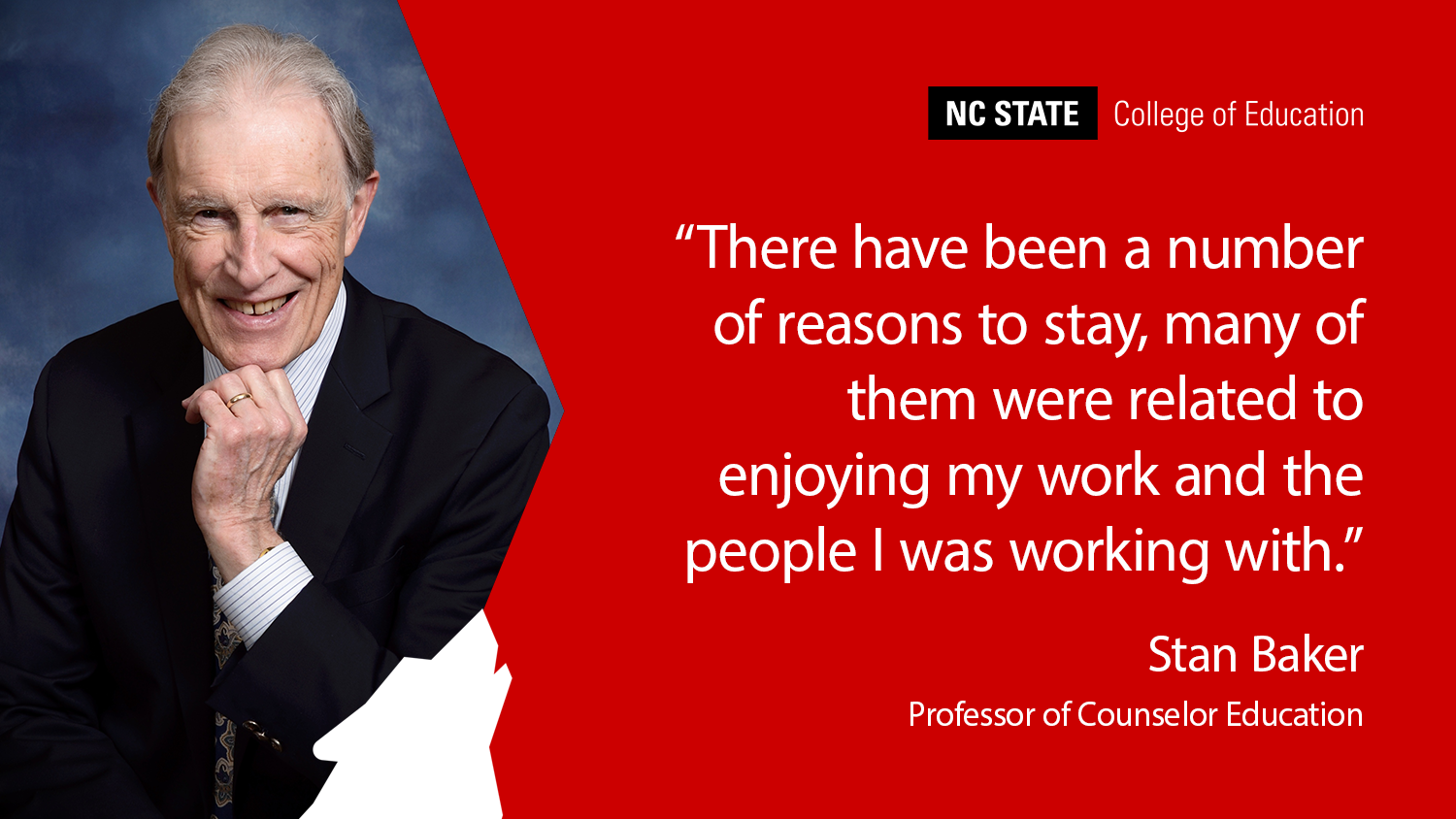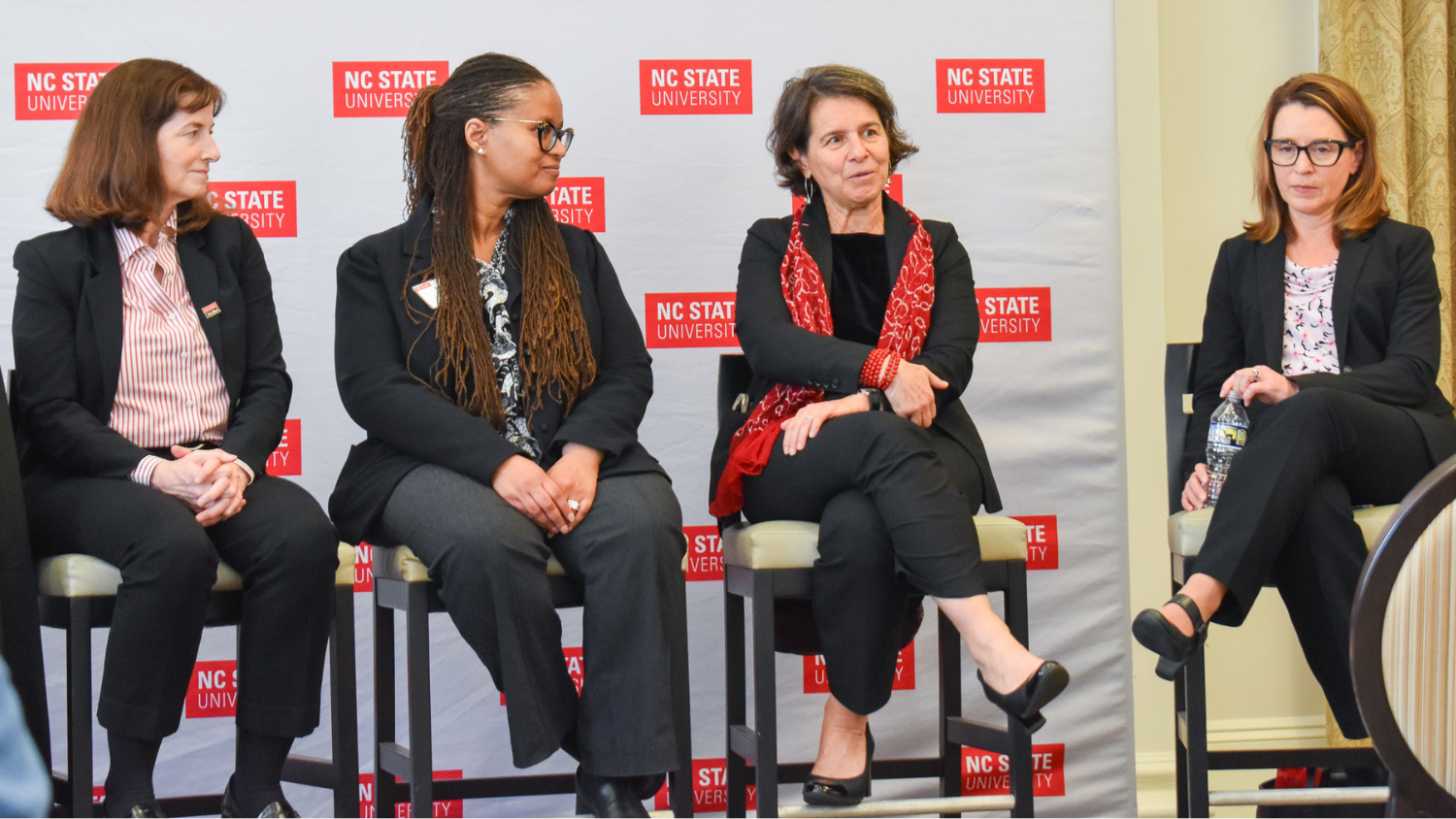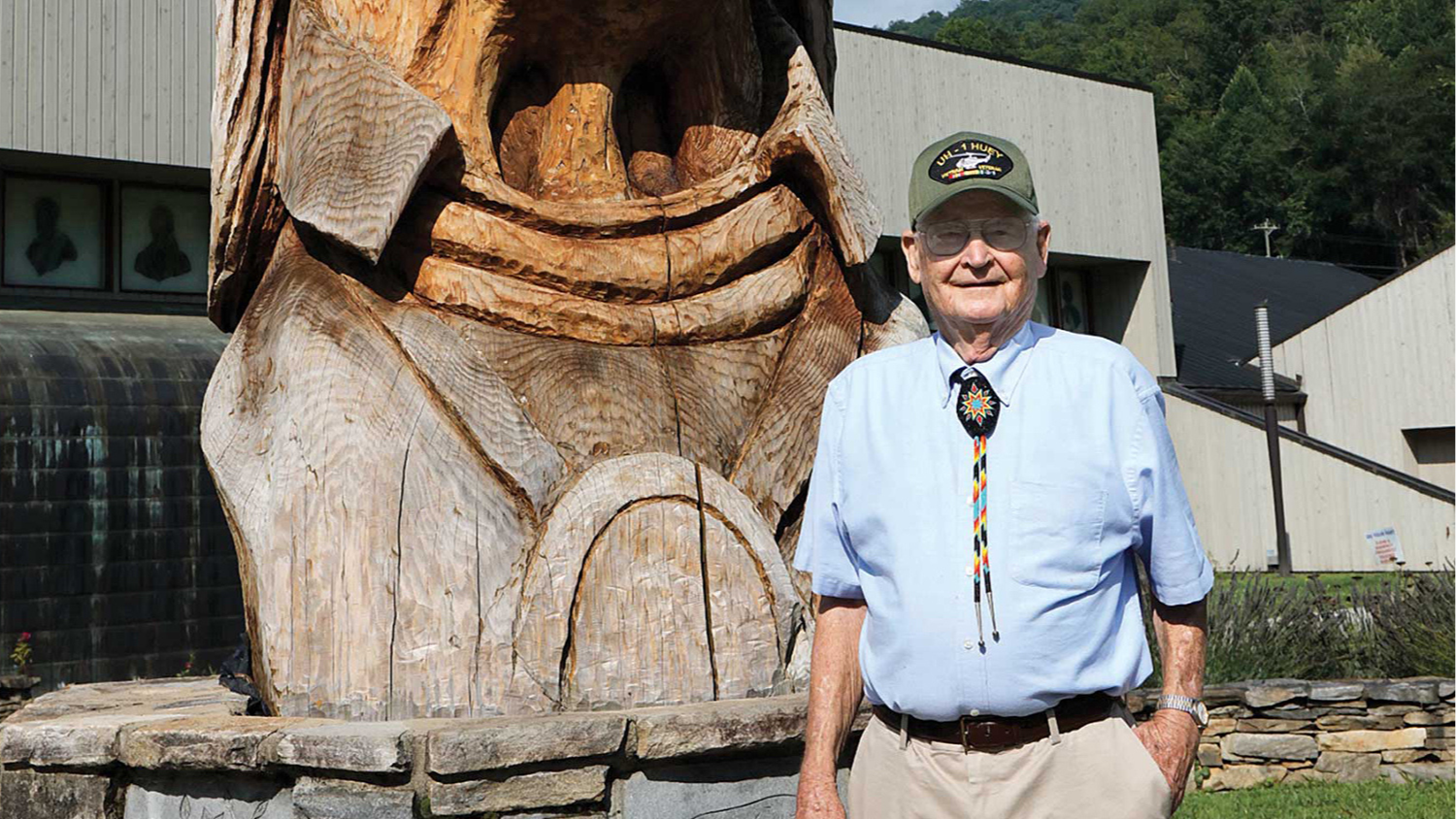‘I Thought I Would Stay for Maybe Five Years:’ Retiring Professor of Counselor Education Stan Baker Reflects on Unexpected Career as Counselor, 30 Years with College of Education

Professor of Counselor Education Stan Baker’s career seems to be an accumulation of serendipitous events. When working as a history teacher in the 1960s, he gained an interest in school counseling through a friend. Several years later, although Baker was content in his new career as a school counselor, he took an opportunity to travel to Buffalo for a summer institute, which began his journey to earning a doctoral degree and becoming a counselor educator.
By the time he joined the NC State College of Education in 1994, he was already almost 60 years old and assumed he would only stay for about five years. But, his passion for the work kept him in the classroom for nearly 30 more years.
Now, as he plans to retire this summer, Baker reflects on his journey to becoming a counselor and counselor educator, his favorite memories in his work and the impact he’s had on students.
The following Q&A has been edited for length and clarity.
Why did you initially choose a career in counseling?
It was more or less serendipitous. When I got my bachelor’s degree in 1957, the only counselor I’d had any contact with was in high school. I was teaching at a small, rural school in Wisconsin, so we didn’t have counselors, but it turned out that there were four faculty members who became interested in it and one of them was a friend of mine who was an English teacher.
He was doing a master’s program, doing summer classes at the University of Minnesota. I knew I wanted a master’s degree, but I was a history teacher and athletic coach, and I didn’t want a master’s degree in history, and I didn’t want to be a school principal. So, I thought I’d try out what my friend was doing. I enrolled in summer classes at the University of Minnesota and, over a series of four summers, I got my master’s degree and got to appreciate what they were teaching.
At the same time I got the master’s degree, I moved to take another history teaching position and coaching position in a small city in southern Wisconsin at a relatively large high school. The second year I was there, the counselor left, and I decided to apply for the job. So, serendipitously, I became a counselor and eventually gave up the coaching and the teaching and decided that being a school counselor was going to be my career.
What inspired you to become a counselor educator?
That was serendipitous, too. There was a piece of legislation that passed in 1959 called the National Defense Education Act (NDEA), which was a response to the Russians launching Sputnik and making Americans feel that they were behind in science and technology. So, throughout the country, the government was paying collegiate programs to sponsor summer institutes for teachers and counselors to come and be trained to do a better job of guiding students into math, science and foreign language. It really was a shot in the arm for counselor education programs because they had all this money to invite people in for summer programs and build their programs up.
For me, I was more or less happy being a school counselor. I had a family, and I was in my 30’s at the time and settled in, but I saw this program as a summer vacation opportunity because they were paying me to be there and bring my spouse and children with me. I attended it at the State University of New York at Buffalo – now they are the University of Buffalo – and when I was there, I found it very invigorating and found myself very involved in the courses and received an invitation from them to join their doctoral program.
In about 1969, we shuffled off to Buffalo, and we were there for about two years, and I got my doctoral degree, still wondering what exactly I was going to do with it, when there was an opportunity to take a job as an assistant professor at Penn State. I moved to Penn State in 1971, and that’s how I became a faculty member and, sometime in the early years when I was there, I realized that this was the career for me and this is what I wanted to be.
What inspired you to stick with it for all these years?
When I made the move to NC State, I was already close to 60 years old and had thought that I was going to finish my career at Penn State. But, I knew a lot of people professionally at NC State, and they were looking for a new department head, and they recruited me to apply for it. I became the department head in counselor education in 1994, and at that time there were about eight departments in the college, and we were the smallest one with only six faculty members.
Even then, I thought I would stay for maybe five years and then I thought maybe I would stay until I was 70. My second wife and I thought we would retire to Hilton Head, but one thing led to another, and we decided not to move, and there were always reasons for me to stay at NC State, and it just kind of went on and on, to the point where I decided I had to make a decision.
I told my colleagues I was going to retire in the spring of 2025; however, in January, I was diagnosed with a heart condition, which forced me to retire at the end of this year. There have been a number of reasons to stay, many of them were related to enjoying my work and the people I was working with and not really having a strong desire to retire so that I could have a different lifestyle.
What fond memories from your nearly 30 years in the College of Education stand out to you?
In the early years when I was here, we were able to get all of our programs accredited by CACREP. Also, although it wasn’t my accomplishment particularly – it was more Dr. [Raymond] Ting’s accomplishment – we were able to grow our program to be online, but I was part of being able to grow that. And, of course, over the years there are the number of people I’ve been able to mentor and the number of faculty whom I’ve been able to work with.
What moments in your career are you most proud of?
There were several instances throughout my entire career where I was able to successfully advocate for colleagues and programs. Also, seeing colleagues and former students be successful. It’s a large number of people, which is an accumulation of being around so long.
How do you believe your work has made an impact on your students and/or the field?
If my students modeled after me, I think I provided a very good model for mentoring; I cared for them and was patient and focused on strengths rather than weaknesses. I’ve supervised a lot of people in their counseling, so I provided the same kind of modeling and mentoring to help them become good to excellent counselors. I’ve been able to train counselors at the master’s level and counselor educators at the doctoral level.
In my later years, I think I’ve also become a role model for conducting research and a role model for scholarly writing. I’ve been able to teach those classes and provide a model for our doctoral students, particularly, through my own work.
What are you most looking forward to in retirement?
I’m looking forward to having more time to myself and figuring out how to use that time. I’ve finally reached the point where I’m looking forward to not doing the things that have been rewarding throughout my career. I hope to recuperate and have more time to just not do anything on a schedule.
I enjoy reading, spectator sports, and I live in a community that always has something going on. I’ve missed a lot of that because I’ve been working, so I’ll be able to sample that more and get more involved with our community. There will be more time for family, too; we’ve got five children, five grandchildren and two great-grandchildren.
- Categories:


